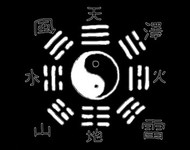Beginner's Guide to I Ching - What is the I Ching?
Posted by Hilary Barret
What is the I Ching?
There are so many ways to answer this one! The I Ching is the world's oldest oracle; it's a book of Chinese wisdom; it's the accumulated experience of over 2,500 years of diviners and sages, and beyond that of unimaginably ancient oral traditions; it's the voice that has been offering people help and wise, genial guidance for generations.
The I Ching as you buy it today will be a collection of texts - a wonderful mixture of imagery and advice, philosophy and poetry - divided into 64 'chapters'. These are the 64 hexagrams, which means simply a pile of six lines, either broken or solid.
When you consult the I Ching, you build up a hexagram line by line according to the results of coin tosses or one of the other methods, such as sorting yarrow sticks or pulling marbles from a bag. All the translations will tell you how this works - it's absurdly simple. And so you are pointed to a particular collection of texts - and, if one or more of your six lines is in the process of changing from solid to broken or vice versa, then there are also line texts to read, and the second hexagram that's formed after the lines have changed. A hexagram isn't just a convenient chapter heading - it's also a very simple, elegant picture of how the energy is flowing through the situation. I Ching means 'Book of Changes', and change is really the one constant throughout the book. The hexagrams are not so much static pictures as ways to move: Creating, Receiving and sustaining, Beginning, Learning, Waiting, Arguing...
What can I achieve with it?
This is a far better question than 'what can it do for me?' Whether you use Runes, Tarot, the I Ching - or indeed consult a psychic or a reader - the power actually to bring about change stays with you. The I Ching is simply an oracle: it answers your questions. Its answers bring you into contact with something fundamental and unchanging, but at the same time absolutely, vividly connected to your present situation. It brings deeper insight - and that in turn empowers you to make changes for the better.
I have seen the I Ching help to bring harmony to relationships, and deepen and strengthen spiritual practice, reassuring or challenging as the need arises. It's also been known to guide lawyers through important cases, offer very practical business advice, and help with investment decisions. I know that this sounds like an extraordinary range of subjects, but I have a feeling that we respond in this way only because we have lost the connection between everyday life and spiritual practice. The I Ching restores this - which is one reason why it is so constantly stimulating and challenging to consult.
In practice, I have found that most people value the I Ching for its ability to help in their relationships. Its answers are extraordinarily sensitive to the nuances of human interactions - in business and friendship as well as love. This is not the same as the 'genuine clairvoyant psychic will find you your soulmate' type of thing! Used with sincerity and respect for the other person's privacy (very important!) the I Ching can bring greater understanding of the other person's feelings and how the situation looks from their perspective. You can be better prepared for the challenges ahead, and negotiate current problems successfully. This is probably the area in which I've gained most from the I Ching myself - including a valuable friendship that was well on the way to becoming enmity before I asked how to rescue it!
Can it predict the future?
I have found that the I Ching can answer my questions about anything that is, at least within the limits of my own understanding. So I'd expect a reading to give me a good idea of, for example, the likely outcome of an election, assuming that most people had already decided which way to vote. This looks like predicting the future, but it works through the I Ching's unparalleled insight into the present. We are free individuals, so neither the I Ching nor any power on earth can predict what we'll decide before we decide it.
What the I Ching does do - and this is an enormous help - is to tell you what challenges and opportunities you are likely to face if you take a particular path, and how you can negotiate the obstacles you meet. This is the opposite of 'fortune telling'. Being told what will happen, as if your own choices had nothing to do with the outcome, is deeply disempowering. The I Ching tells people what effects their choices will have, and helps them to develop strategies to achieve their goals.
The danger with any form of divination is that the user starts to consult it for every decision, or tries to use it to take the responsibility of decision away from them. The I Ching gives that responsibility straight back! 'If you have no place to go,' it might say, 'it's fortunate to come back. If you have a direction to go, it's fortunate to set out at daybreak.' Or 'the first consultation is informative; the second and third create confusion.' In its kindly but decidedly blunt way, the I Ching cares for the people who use it.
How do you learn it? What's the first step?

Trying to 'learn the I Ching' by reading books about it is rather like trying to get to know someone by looking at their photograph: it doesn't get you very far! Simply find a translation (not just an interpretation or a 'simplified version'), get to grips with the method, and start asking questions. If you don't have a specific question, you can always cast a hexagram for the day, or the week, and spend time contemplating it at the end of the period it describes as well as the beginning. Given time and thought, this can be a very powerful way to build up an understanding of the hexagrams.
To be honest, understanding the answers can be a little complicated at first. The I Ching can give very good advice on website design, for instance, but it will do so in 3,000-year-old imagery. It takes time to get used to this, and almost everyone finds it hard to make sense of their first few answers. There are some very good commentaries available that will help, or you could ask a reader for help. Readers can also come in useful when someone approaches the I Ching for the first time when they urgently need answers to an important question. I compare it to running a dinner party: if 10 important guests are arriving in an hour, it might be better to hire a chef than to start learning to cook! (Yes, there are 'learn the I Ching in 11 1/2 minutes' books out there. They are the divination equivalent of giving those guests a pot noodle.)
What kind of person can learn it? Do you have to be psychic? Or brilliantly intellectual?
You can be sure that every talent you possess - and probably a few you never suspected you had - will be called on in your relationship with the I Ching. But I don't believe that you need to be a particular kind of person, or have particular abilities, in order to get to know it. This is because it works on so many different levels. I know some people who revel in it as a pure system of lines and patterns; others who are happy simply to talk with it; others who like to search for the earliest meanings of the Chinese characters - originally, the words of the I Ching are pictures - or the ancient shamanic traditions behind its imagery. It's like a tremendous building: you enter through whichever door appeals to you, and gradually begin to sense the vast beauty of the space around you. There's no need to be especially 'psychic' to do this: truth is everywhere, it's not hidden away from all but the select few.
Still, there are a few prerequisites for a rewarding relationship with the I Ching. It is not a machine for the delivery of instant answers, or to confirm people in their ideas. Like any worthwhile relationship, this one takes time and patience to develop, and calls for openness and sincerity. At some stage, the I Ching may ask you to think the unthinkable - it will surely offer you the opportunity to grow.
Why is the I Ching still popular?
The I Ching has been slower than, say, the tarot, to find widespread popularity in the West. I think this is because the intensely individual nature of a relationship with the I Ching does not easily survive into simplified, 'instant', 'one-size-fits-all' versions. There are some wonderful translations available now that allow you to develop a real relationship with the oracle - sadly, there is also a lot of wasted paper. Yet the I Ching's popularity is definitely growing right across the world: I only need to look at my own site's forum to see this. Perhaps more importantly, there are many people who have been using the I Ching constantly for 20, 30 or 50 years.
I once asked the I Ching itself: 'what is the basic human need that you answer?'. It gave Hexagram 49, Radical Change, changing to Hexagram 48, the Well. Radical Change means revolution, the old order overthrown as a snake sheds its skin. Some would say that this is a good description of modern society (a New Age?) - but anyone who has lived through significant change in their own life will surely recognise that sense of everything turning inside out. The I Ching sets this in context:
'The Well: moving the city, the well does not move.
No loss, no gain, going, coming - the well is...'
Our way of life has changed beyond recognition, countless generations have come and gone and drawn water, and the ever-present Well of the I Ching still lets us reach the limitless Source.
There are three moving lines in this answer, showing exactly what the I Ching makes possible. 'Bound with yellow cow-hide', it holds the questioner fast to the realities of her situation. 'Your own day, so change it! Set forth, good fortune, no mistake.' We can make changes that work, and...
'Regrets vanish, there is sincerity and confidence. Change destiny. Good fortune.'
Renew the 'orders from above'; challenge who or what is running your life. Change destiny.
ENDS
© holisticshop 2001. All rights reserved



